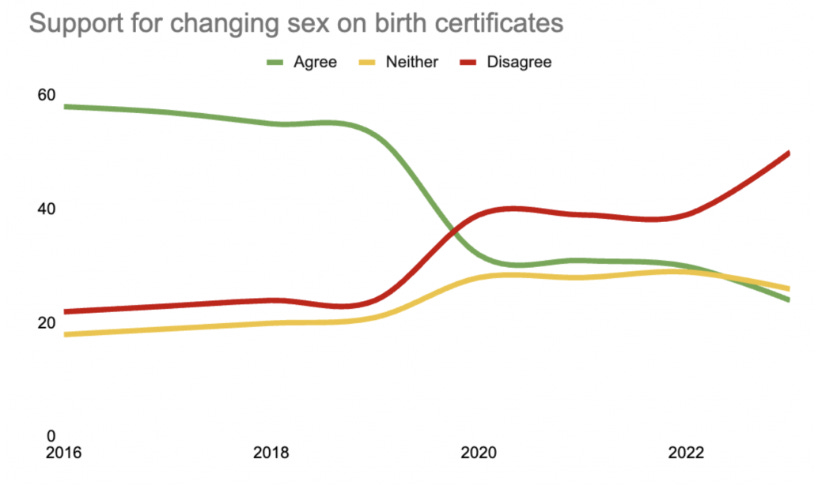The Ministry ploughs on
Despite very clear statements in the Coalition Agreement and in the media that gender ideology is to be removed from the RSE Guide, the Ministry of Education ploughs on with its trans activist advice to educators.
Its new standard for Toilets and Changing Spaces, uploaded to its website four months after the election, is in complete submission to transgender beliefs and crassly dehumanises girls in the process. Read more about it in this article published on Plain Sight.
For the “Pride Month” of June, the MoE promoted its “Guide to LGBTQIA+ Students” on social media platforms. This Guide includes recommendations for students to be permitted to use facilities that “align with their gender identity” and, in a gross breach of trust, advises schools to “check with the student about the name and/or pronouns they want to be used in the records that parents or caregivers may see, as they might be different to the ones they use at school.”
The Guide also recommends resources provided by activist groups like InsideOUT and Rainbow Youth whose websites lead children to ever more extreme versions of gender ideology. These rainbow lobby groups universally glamourise the concept of being trans and convince children it is possible and even easy and desirable to change sex.
Meantime, the RSE Guide remains in place and no plans for its overhaul have been shared by the Minister, apart from an announcement that the refreshed curriculum for Health will be ready for trial by Term 4, 2025. Consultation must surely already be under way but, as far as we know, no one critical of the influence of gender ideology in our schools has been invited to contribute.
Non-committal response to Open Letter
RGE’s Open Letter advocating for good quality RSE was sent as a hard copy on 28th May – with eleven pages of signatures – to the Minister of Edcuation and also separately to Matt Doocey, David Seymour and Winston Peters.
Ten days later we followed-up with an email to Minister Stanford, seeking confirmation that she had received the Open Letter and asking her three specific questions:
1. What impediments are there, if any, to withdrawing the RSE Guide immediately and asking schools to base their RSE teaching on the curriculum until a new Guide is published?
2. Following the Cass Report, will the government state categorically that it does not support ideological content around gender identity being taught as fact in schools?
3. Are you aware that the Ministry of Education continues to fully support gender identity ideology in its practices? For example, in March 2024 an updated version of the Toilets and Changing Spaces design standard was uploaded to its website. On p 23, the standard recommends insulting signage that reduces women and girls to their bodies' menstrual functions. The suggested sign icons are not suitable for primary schools where nearly all the girls are pre-menstrual, nor for intermediate or secondary schools, where girls deserve private spaces that are categorised by their sex and not by accessibility to period product disposal.
In her reply, Minister Stanford responded in the usual non-committal way and did not answer any of the above questions.
Thank you for sharing your views with me. It is important that young people are taught about relationships and sexuality, and both schools and whānau play an important part in this. What I want to ensure is that curriculum content and guidelines are clear, age appropriate and meeting the needs of our school communities, and I am in the process of looking into this. I have passed your feedback on to the Ministry of Education for their consideration. (Erica Stanford email to RGE, 20 June 2024.)
You may wish to write to the Minister yourself (E.Stanford@ministers.govt.nz), asking Q1 in particular, because every day the RSE Guide remains in place is another day that children are being taught the falsehood that it is possible and even joyful to change sex.
New support group for NZ teachers
CENNZ: CONCERNED EDUCATORS NETWORK NZ
This support group for female gender critical teachers is inviting in new members. Five current members who set it up and make up the core leadership team are from Auckland, Taranaki, and the South Island and come from all levels of the education system, early childhood to tertiary.
The group’s priority is confidential support for each other so it is firstly a place for support, advice, sharing and discussing ideas. Ideas about wider action are welcome but no pressure is put on members to be involved in action if they feel it is not safe or appropriate.
All new applicants are carefully vetted for everyone’s privacy and job security. New members will be asked if they can name a gc person on a gc facebook page who vouches for them, and also to take a face-to-face zoom or messenger call. There is an option on joining under an alias Facebook name but real name details need to be initially shared with the CORE member vetting them. To express interest in joining please email: CENNZ@outlook.com
Gender in schools a hot election topic in UK
New safeguarding guidelines were published on the Department for Education's (England and Wales) website last month. The updated guidance has replaced the word ‘transgender’ with the phrase ‘gender-questioning’ (see p55. NB this part is still under review.) It says schools should support ‘gender-questioning’ children by working ‘in partnership’ with their parents. This revised policy is statutory, meaning that teachers are legally obliged to abide by it.
However, the National Education Union, Britain’s largest teaching union, has vowed to ignore it and now the Labour Party’s spokesperson for Education, Bridget Phillipson, has refused to confirm she would keep the guidance if elected.
Gillian Keegan, the Education Secretary who implemented the new guidelines, responded, “The Shadow Education Secretary confirmed this morning that a Labour government would play politics with the lives of our children by ripping up guidance on gender questioning children, effectively allowing contested gender ideology to be taught in the classroom”.
The Cass Review is a significant event
The British Medical Journal has described The Cass Review as “A seminal moment in contemporary medicine”.
The BMJ condemned the influence of ‘multiple lobby groups’ over policy making, stressed the need for ‘strong leadership’ and spoke of ‘medicine backing off from prescriptions and surgery’ when treating gender-confused children. “Medical institutions must treat The Cass Review as a significant event and act upon it”, it says. (Credit: Graham Linehan)
Collapse of support for gender beliefs
Sex Matters reports that the latest annual British Social Attitudes report from the National Centre for Social Research has found a collapse in support for birth certificate sex changes. The 58% support for the policy in 2016 has reversed so that in 2023 a majority of people in the UK think that people should not be allowed to change the sex recorded on their birth certificate.
Researchers also asked for public opinion on trans rights and found that a substantial 47% of those questioned believe ‘trans rights’ have ‘gone too far’.
Fiona McAnena of Sex Matters commented, “This huge swing in opinion is down to the fact that the more the public understand the real-world impact of pretending that people can change sex, the less they like it. People now realise that this is not just a case of being kind to a tiny minority”.
This survey should help politicians to realise that if they want to move on from what they consider to be a divisive issue, they need to stop pledging allegiance to the vague and ever-expanding concept of “transgender rights” and instead be clear that they are concerned about equal rights and finding accommodations which do not undermine the rights of the majority. (Sex Matters)
A survey in the US shows a similar loss of support for gender ideology although support for gay and lesbian rights remains strong.
About 1 in 4 Americans reported they would be very upset if their child identified as trans or ‘non-binary’, double the number of people who’d feel the same way about a gay or lesbian child.
Meanwhile, figures just released by NHS England seem to demonstrate a considerable decline in demand for gender services among minors under 18 years of age. Referrals for 2022-23 were in excess of 3390 but in 2023-24 they had fallen to about 2550.
Transgender Trend commented:“ This is the first time in 9 years that referrals of children to gender services have fallen sharply. Maybe it's because there's more awareness among parents of the harms of 'gender affirmative' medicalisation. Maybe teens are moving on to the next thing, as teenagers do.”







